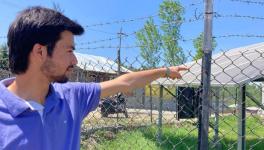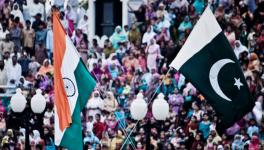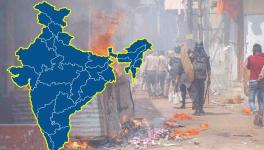Kashmir: Govt Bans Eid Milad Congregation at Hazratbal Shrine for First Time
File Photo.
Srinagar: Thousands of devotees were left heavy-hearted on Saturday, November 9, as the government disallowed the commemoration of birth anniversary of Prophet Muhammad at the Hazratbal sufi shrine in Srinagar.
The government has also imposed Section 144 in Srinagar which prohibits the gathering of more than four persons. The police laid a heavy cordon around the sufi shrine, situated on the banks of Dal lake, and all major entry and exit routes to the shrine were blocked with check-posts and concertina wires.
Muslims around the world celebrate Prophet Muhammad's birthday every year on the 12th day of Rabi al awal, third month in the Muslim lunar calendar. Hundreds of thousands of devotees would travel from across the Valley to participate in the annual congregations held at Hazratbal shrine that last for nearly a week.
The authorities have only allowed local residents living in the shrine’s vicinity to participate in the celebrations.
Authorities, in an unprecedented decision, banned these congregations causing tumult amongst the devotees who were prepared to participate in the rituals that included the sighting of holy relic of the Muslim prophet on the following Friday.
Also read: The Blatant Omission of Muslims in ‘New India’
Abdul Waheed Hamdani of Khanqah told NewsClick that he was heartbroken due to the ban on attending the gathering at the shrine. "It will be for the first time that I will not attend the night-long prayer ceremony at the Dargah. I always looked forward to attending the congregations," Hamdani says.
Earlier last week, the authorities also banned another annual congregation called "Khoja Digar" in local parlance at another sufi shrine, Khwaja Naqshbandi sahib at Nowhatta for the first time.
The congregations at these two shrines had remained unaffected despite decades of violence and uprisings in Kashmir. Many locals believe that the government is making attempts to provoke them.
"This is an attack on our religion and faith and these bans are aimed to hurt our faith clearly," Mushtaq Ahmad, a resident of Nowhatta, says.
A severe clampdown was imposed in Kashmir since August 5 as government unilaterally abrogated Article 370 and bifurcated Jammu and Kashmir into two union territories. Hundreds of persons including politicians, lawyers, businessmen were arrested in the wake of the revocation of the law that extended semi-autonomy to J&K.
Since August, prayers at Srinagar's central mosque Jamia Masjid, located in the vicinity of Naqshbandi shrine, have also been banned by the authorities. Prayers at Jamia Masjid, considered to be a bastion of separatist politics where senior separatist leader Mirwaiz Umer Farooq delivers weekly Friday sermons, had been banned earlier as well during summer uprisings in 2010 and 2016.
Both Naqshbandi sahib shrine and Dargah Hazratbal receive patronage from mainstream political parties, especially National Conference, whose leaders would often participate in the congregations here.
In fact, founding member of NC and father of incarcerated NC president Farooq Abdullah, Sheikh Abdullah was instrumental in the rebuilding of Hazratbal mosque after he was released from jail in 1963 after 11 years.
Get the latest reports & analysis with people's perspective on Protests, movements & deep analytical videos, discussions of the current affairs in your Telegram app. Subscribe to NewsClick's Telegram channel & get Real-Time updates on stories, as they get published on our website.
























